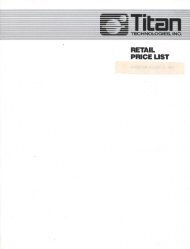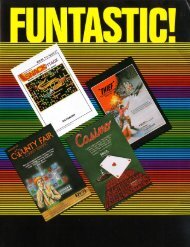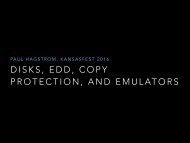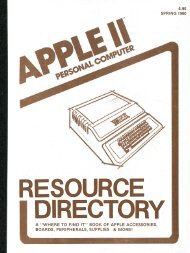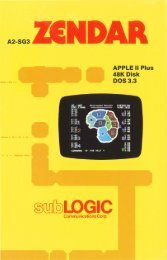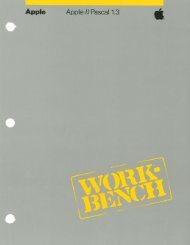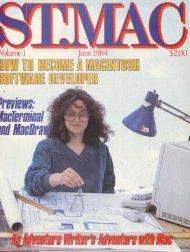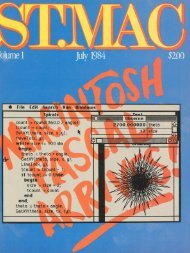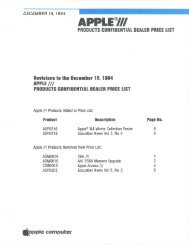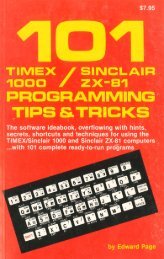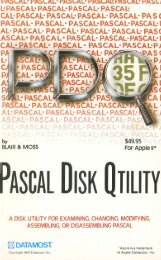Create successful ePaper yourself
Turn your PDF publications into a flip-book with our unique Google optimized e-Paper software.
80 Apple Orchard<br />
<strong>•</strong> An interactive, symbolic debugger;<br />
<strong>•</strong> Full support of duplicate directories, including "markdup·<br />
dir," "copydupdir," and "recover" programs (See Dr. Wo's<br />
column in the Winter 1981 Apple Orchard .PCW)<br />
<strong>•</strong>Various other utilities including a P-code disassembler and·<br />
the famed "patch" program, a byte-level editor;<br />
<strong>•</strong> BIOS attachment utilities;<br />
<strong>•</strong> Primitives for concurrent processing and interrupt<br />
handling;<br />
<strong>•</strong>A variety of new memory management procedures which<br />
should facilitate development of routines for processing<br />
arrays;<br />
<strong>•</strong> Memory management procedures for controlling the<br />
residency of segments and units under program, as<br />
opposed to compiler, control;<br />
<strong>•</strong> Extended system memory management so that application<br />
programs can make use of the larger memories in the<br />
coming computers;<br />
And ...<br />
<strong>•</strong>Complete portability of software between the Apple 11, Z-80<br />
machines, the IBM-PC, 68000-based machines, 6809 machines,<br />
Tl 9900 machines, LSI-11/PDP-l 1, ... and others.<br />
Specific to the Apple II<br />
<strong>•</strong>* Drivers included for a variety of peripherals, including all of<br />
the standard Apple ones and Micro-Sci floppies, SVA 8-inch<br />
floppy disk controller, lower case adapters, CCS serial card,<br />
SSMAIO serial card and Sup'R'Term, Smartterm,Videx, and<br />
Double Vision boards;<br />
<strong>•</strong> A completely relinkable BIOS which allows you to take<br />
advantage of the above-mentioned drivers;<br />
<strong>•</strong> A configuration utility which allows you to set such<br />
parameters as whether you have installed a jumper to enable<br />
true shift key operation from the Apple II keyboard.<br />
Going Down<br />
I like this system. I like it a whole lot. But it's not the best<br />
system if all you'll work with is the Apple 11; it works better on<br />
other computers. What's the down side?<br />
The Version IV system is noticeably slower on the Apple II<br />
than is Apple Pascal. This is because the system architecture<br />
is quite different and because the system is heavily<br />
swapped, leading to more disk 1-0 than with Apple Pascal.<br />
This system will be very hard to use with only(!) two disk<br />
drives, not only because of the swapping mentioned above,<br />
but also because the SYSTEM.PASCAL file is much larger<br />
than the Apple Pascal version. The score is UCSD 84 blocks<br />
without debugger, Apple 41 blocks. So there's less space<br />
on the boot disk<br />
Consider this: the System Filer is now segmented; not all<br />
of it resides in memory at once. You will swap disks while<br />
using the Filer, even on a two-drive system. This can be<br />
tricky, or inconvenient, or both.<br />
The Version IV system as marketed by Softech sells for<br />
$750 (not including the RAM card), which is more than<br />
Apple Pascal. Surprised? Don't be. Remember, Apple the<br />
Company sells hardware, and software to sell hardware;<br />
Softech sells ... software. We also don't know the details of<br />
the licensing agreements with the Regents of UC, etc. The ·<br />
price difference is substantial. So are the differences<br />
between the operating systems. Which system is for you? I<br />
can't answer that question for you, but I can answer it for<br />
myself.<br />
Let's suppose I was an experienced BASIC programmer,<br />
had an Apple II with two floppy drives, and was about to<br />
purchase Pascal for the first time. The choice is Apple<br />
Pascal hands down; there's plenty of room to grow into this<br />
system and to learn some very exciting things.<br />
Now suppose I was an advanced hobbyist; a reasonably<br />
experienced Apple Pascal programmer looking forward to<br />
upgrading my system by hanging on an 8086 processor<br />
with 128K RAM on board, and a mini-Winchester hard disk I<br />
don't know that I'd rush out and get Softech' s Pascal, or the<br />
CP / M MT+ discussed in the March-April 1982 Apple<br />
Orchard, but I sure would be wondering who is going to<br />
bring up Pascal on my new processor and how, and what<br />
version they plan on using. I'd hope for the best: both<br />
operating systems making full use of my new computer's<br />
capabilities.<br />
Or, suppose I was a cottage industrialist, developing<br />
applications software and hoping to reach the broadest<br />
possible customer base in the shortest time. Softech's Pascal<br />
would be worth having; sitting in front of my Apple, I<br />
could write programs for any number of machines, availing<br />
myself of all of the powerful features of the new operating<br />
system. I would use Apple Pascal, or the appropriate subset<br />
of it in Softech, when trying to reach the Apple market<br />
specifically. Apple's Pascal is faster, as it's tailored for the<br />
Apple machines.<br />
Finally, let's say I was trying to write software for tomorrow's<br />
computers today. Choice: Softech, going away. New<br />
machines will be far better equipped for emulating the<br />
P-machine than today's Apple II, and will obviate the downside<br />
analysis given above.<br />
Who are You?<br />
The whole point is, that there is a tradeoff analysis which<br />
you must make. Maybe you' re a cynic who believes that new<br />
machines won't be logically thought out in terms of P·<br />
machine capability (History is on the side of the cynic, as<br />
usual. .PCW) Well, on one end of the spectrum is portability,<br />
on the other is the speed and smoothness that comes from<br />
custom-tailoring to the machine architecture. Only you can<br />
say.<br />
Indeed, what have you to say? what are your interests and<br />
objectives? If you' II let me know, I'll try to point my pen ... er,<br />
keyboard, in your direction.



